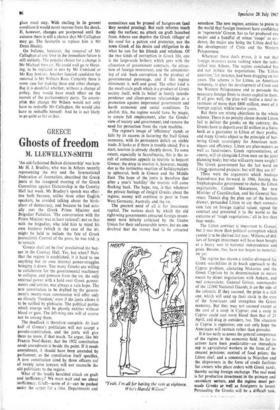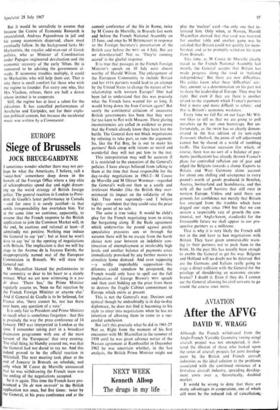Ghosts of freedom
GREECE M. LLEWELLYN-SMITH
'An old-fashioned Balkan dictatorship' was how Mr H. J. Bradley, who was in Athens recently representing the NUJ and the International Federation of Journalists, described the Greek junta at the inaugural meeting of the Greek Committee against Dictatorship in the Conway Hall last week. Mr Bradley's speech was effec- tive both because, unlike three other English speakers, he avoided talking about the birth- place of deMocracy, and because he had actu- ally met the Greek Prime Minister and Brigadier Pattakos. The conversation with the Prime Minister was at least rational'; not so that with the brigadier, who told him to mind his own business (which in the case of the in, might be held to include the fate of Greek journalists). Control of the press, he was told, is to remain.
'Greece shall }et be free' proclaimed the ban- ner in the Conway Hall. Yes, but when? Now that the regime is established, it is hard to see anything but its own internal power-struggles bringing it down. Too many Greeks are willing to collaborate for the governmental machinery to collapse, and pressure from the us, the only external power with a bold over Greek govern- ments and armies, was always a vain hope. The new constitution to be drafted by the govern- ment's twenty-man commission will offer only an illusory 'freedom,' even if the junta allows it to be ratified by plebiscite. The political parties which emerge will be ghostly entities without blood or guts. The left-wing EDA will of course not be among them.
The deadlock is therefore complete. At least half of Greece's politicians will not accept a pseudo-constitution, and the junta will give them no more, if that much. To argue, like Mr Francis Noel-Baker, that the 1952 constitution needs amendment is beside the point. If it needs amendment, it should have been amended by parliament, as the constitution itself specifies, A new constitution sired by three officers out of twenty tame lawyers will not reconcile the old politicians to the regime.
What of the loudly heralded attack on graft and inefficiency? We must wait and see about inefficiency. Graft—some of it—can be pushed under the carpet for a time. Departments and committees can be pruned of hangers-on (and they needed pruning). But such reforms touch only the surface; no attack on graft launched from Athens can deprive the Greek villager of his need for a patron and protector, nor the town Greek of his desire and obligation to do what he can for his friends and relations. Of the two kinds of corruption in Greek life, one is the large-scale bribery which goes with the allocation of government contracts, the attrac- tion of foreign investment, and the administer- ing of aid. Such corruption is the product of governmental patronage, and if this regime eliminates it, well and good. The other kind is the small-scale graft which is a product of Greek society itself, with its belief in family interde- pendence and client-patron relationships as a protection against impersonal government and harsh economic and social conditions. To abolish this, the regime would have, by magic, to create full employment, alter the Greeks' view of society and government, and remove the need for protection from the state machine.
The regime's image of 'efficiency' stands or falls by its success in fostering the frail Greek economy, with its permanent deficit on visible trade. It looks as if there is trouble ahead. For a start, tourism is already sharply down. To some extent, especially in Scandinavia, this is the re- sult of conscious appeals to tourists to boycott Greece; the drop in tourists is, however, mainly due to the instinctive reaction of holidaymakers to upheaval, both in Greece and the Middle East. The hope of the junta is therefore that after a year's 'stability' the tourists will come flocking back. The hope, too, is that whatever the private feelings of émigré Greeks about the regime, money will continue to pour in from West Germany, Australia and the us.
The greatest' need of all is for investment capital. The various deals by which the old right-wing governments attracted foreign invest- ment were bitterly criticised by the Centre Union for their unfavourable terms, but no one doubted that the money had to be attracted somehow. The new regime, anxious to prove to the world that foreign investors have confidence in 'regenerate' Greece, has so far produced one major and a handful of minor 'coups° as evi- dence, the major one being the Litton deal for the development of Crete and the Western Peloponnese.
Whatever these deals prove, it is not that foreign investors came rushing when the tank rolled into Athens. The regime concluded but did not initiate the negotiations. The 'Litton question,' for instance, had been dragging on for years. The scheme is for Litton, an American company, to plan the development of Crete and the Western Peloponnese and to persuade the necessary foreign firms to invest capital in them. If all goes well, the plan will realise a total in- vestment of more than $800 million, most of it foreign capital, within-twelve years.
But there are .strong objections to the whole scheme. There is no penalty clause should Litton fail to deliver the goods; on the contrary, the Greeks have to deposit over $1 million in a Swiss bank as a guarantee to Litton of their profits; and many Greeks object to the principle of bar- tering Greek sovereignty for American tech- niques and efficiency. Litton are plan-makers as well as fund-raisers. Greek representatives, of course, will sit alongside Litton men on the joint planning body; but who will carry more weight? The Greek government has the last word on Litton-sponsored projects; but will they use it?
The-se were the arguments which Andreas Papandreou' put forward in 1966, forcing the Stephanopoulos government to shelve the Litton negotiations. Colonel Makarezos, the new Minister of Coordination, and his General Sec- retary ThanOs dug the plan out of the bottom drawer, persuaded Litton to cut their commis- sion rate on foreign capital raised, signed the contract and presented it to the world as the outcome of 'tough negotiations,' all in less than four weeks.
The Litton contract is important to Greece; but it was more than political corruption which caused it to be shelved last year. Millions of dol- lars of foreign investment will have been bought at a heavy cost in national independence and pride. Besides, they have not begun to material- ise yet.
The regime has shown a similar disregard kr Greek sensibilities in its brash approach to the Cyprus problem, alienating Makarios and the Greek Cypriots by its determination to secure enosis by direct negotiations with Ankara, and real concessions. General Grivas, commander of the 12,000 National Guards, is on• the side of the colonels. If they succeed, the prize is a rich one, which will send up their stock in the eyes of the Americans and strengthen the Greek economy. But they may not succeed except at the cost of a coup in Cyprus; and a coup in Cyprus could cost more blood than that of 21 April, and drag in outsiders, too. The situation in Cyprus is explosive; one can only hope the Americans will restrain rather than provoke.
It is too early to assess the general competence of the regime in the economic field. So far its actions have been predictable—an immediate sop to agricultural workers in the form of in- creased pensions; control of food prices; the Litton deal; and a concession to Niarchos and the shipowners in the form of credit facilities for owners who place orders with Greek yards, thereby saving foreign exchange. The real need is for productive investment in the primary and secondary sectors, and the regime must per- suade Greeks as well as foreigners to invest. Persuading. the Greeks. will be a difficult task. But it would be unrealistic to assume that because the Centre of Economic Research is emasculated, Andreas Papandreou in jail and his young economists dispersed, chaos must eventually follow. In the background lurks Mr Markezinis, the royalist odd-man-out of Greek politics, who as Minister of Coordination under Papagos engineered devaluation and the economic recovery of the early 'fifties. He is rumoured to be advising the government al- ready. If economic troubles multiply, it could be Markezinis who will help them out. That is why there is small comfort for those who wish the regime to founder. For every one who, like Mrs Vlachou, refuses, there are half a dozen whose instinct is to cooperate.
Still, the regime has at least a talent for the ridiculous. It has cancelled performances of Aeschylus and Euripides, not for their explo- sive political content, but because the incidental music was written by a Communist.































 Previous page
Previous page